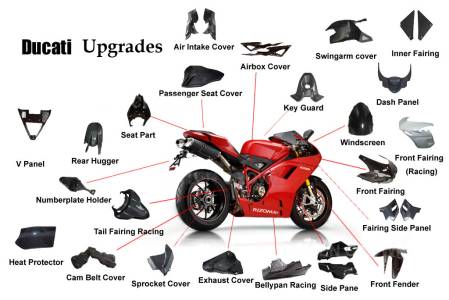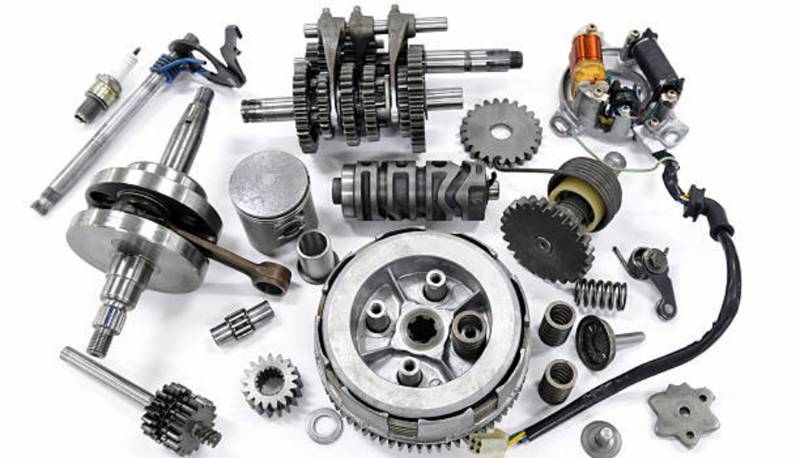Tips for Buying Trusted Bike Parts Wellington Online Without Regret
Tips for Buying Trusted Bike Parts Wellington Online Without Regret
Blog Article
Discover the Essential Motorcycle Components You Required for Ideal Efficiency
Recognizing the crucial parts of a motorcycle is essential for accomplishing peak performance. Each component, from the engine to the braking system, plays a critical duty in overall capability and safety and security. Normal upkeep can protect against unforeseen failings and enhance the riding experience. Many riders neglect the ins and outs of these systems. Discovering just how they collaborate can cause an extra reliable experience. What vital components should every rider focus on?
The Engine: The Heart of Your Motorcycle
The engine functions as the core component of a motorcycle, driving its performance and specifying its abilities. It is in charge of converting fuel into mechanical energy, which powers the bike onward. Different kinds of engines are used, consisting of single-cylinder, V-twin, and inline arrangements, each offering unique qualities fit for different riding styles and purposes. The engine size, usually gauged in cubic centimeters (cc), substantially affects efficiency, with larger engines usually offering even more power and torque.Furthermore, the engine's layout and innovation, such as gas shot systems or air-cooling versus liquid-cooling, impact efficiency and reliability. Maintenance is essential for peak operation; variables like routine oil changes and checking stimulate plugs warranty durability. Riders commonly think about an engine's responsiveness and level of smoothness, as these qualities enhance the overall riding experience. Ultimately, the engine stays an essential component that defines not just the bike's efficiency but additionally the rider's link to the maker.
The Transmission: Changing Gears Smoothly
The transmission plays a crucial duty in a motorcycle's efficiency, specifically in the technicians of gear shifting. Recognizing how to change gears efficiently can enhance the overall riding experience, while normal upkeep guarantees peak capability. Proper attention to these aspects can significantly impact the long life and effectiveness of the motorcycle.

Equipment Shifting Mechanics
Smooth gear moving is important for suitable motorcycle efficiency, significantly impacting both velocity and control. The auto mechanics of equipment shifting include the interaction between the clutch, equipment bar, and transmission system. When a motorcyclist engages the clutch, it disengages the engine from the transmission, enabling a gear change without harming the parts. A well-timed release of the clutch, combined with specific activity of the gear lever, promotes a seamless change between gears. This process ensures that the engine operates within its best power band, enhancing performance. Motorcycle Spares Christchurch. Additionally, recognizing the gear proportions and their effect on speed and torque can assist riders make educated options during shifts, inevitably adding to a more receptive and pleasurable riding experience
Maintenance Tips Relevance
Regular upkeep plays a crucial function in assuring that the transmission system runs successfully, permitting smooth gear changes. Consistently changing the transmission and examining fluid is crucial, as old liquid can cause increased friction and wear. Furthermore, evaluating the clutch for wear guarantees peak interaction and disengagement, avoiding slippage during equipment adjustments. Lubrication of moving components is similarly crucial to minimize friction and improve efficiency. Bike owners ought to also keep an eye on for leaks and uncommon noises, as these can indicate underlying concerns. By sticking to these maintenance ideas, riders can lengthen the life-span of their transmission system, ensuring that equipment shifts stay smooth and adding to the overall performance of their motorcycle.
The Braking System: Ensuring Safety on Every Trip
Braking systems are fundamental components that straight affect a motorcycle's safety and security and performance. They include various parts, including brake pads, rotors, calipers, and hydraulic lines, all working together to assure effective slowdown. The kind of stopping system-- commonly either disc or drum-- affects responsiveness and stopping power.Regular upkeep is necessary to promote peak efficiency; used brake pads can cause decreased effectiveness and increased quiting ranges. Furthermore, the quality of brake fluid should be kept track of, as it can soak up wetness with time, endangering stopping efficiency.Riders ought to additionally consider the value of anti-lock stopping systems (ABS), which prevent wheel lockup during sudden quits, improving overall safety. Correctly functioning brakes are not almost quiting; they infuse confidence in the biker, enabling much safer navigation via different terrains. Inevitably, a trustworthy stopping system is essential for delighting in every adventure with satisfaction.
The Suspension: Enhancing Comfort and Control
A well-functioning suspension system significantly adds to a motorbike's overall performance, enhancing the performance of the stopping system. The suspension plays a substantial function in taking in shocks from irregular surfaces, assuring a smoother experience while maintaining tire contact with the roadway. This get in touch with is essential for both stability and control, enabling riders to browse corners with self-confidence and precision.Different kinds of shock absorber, such as telescopic forks or mono-shocks, provide varying levels of convenience and handling. Appropriately tuned suspension improves responsiveness, offering the biker with a much more linked feeling to the motorcycle. Routine upkeep checks are vital to establish the suspension parts, consisting of springs and dampers, are working at their finest. A reliable suspension system not only raises the riding experience however also contributes to the long life of other motorcycle components by decreasing wear and tear. Consequently, investing in high quality suspension is important for any kind of serious motorcycle fanatic.
The Tires: Linking You to the Roadway
Tires play an essential role in a motorbike's efficiency, serving as the key web link in between the biker and the road. Recognizing the various kinds of tires readily available can greatly impact dealing with and security. Additionally, regular upkeep is important to assure peak tire performance and longevity.
Tire Types Explained
Exactly how do different tire types influence a motorcycle's efficiency? Tire types play an essential role in identifying a motorcycle's hold, handling, and stability. Sporting activity tires, designed for high performance, offer improved traction and responsiveness on smooth roads, making them suitable for racing and aggressive riding. On the other hand, visiting tires prioritize resilience and comfort, giving a smoother ride for long-distance travel. Off-road tires, defined by their tough step patterns, excel in grip on unpaved surface areas, suitable for journey enthusiasts. In addition, dual-sport tires mix features from both on-road and off-road groups, satisfying flexible riding demands. Inevitably, picking the right tire kind is important try this for optimizing performance, ensuring safety and security, and improving the overall riding experience.
Maintenance Tips Offered
While riding on the roadway, preserving optimal tire condition is crucial for security and efficiency. On a regular basis inspecting tire stress is necessary, as under-inflated tires can lead to bad handling and increased wear. It is advisable to evaluate tread deepness often; worn tires concession grip and security. On top of that, bikers should try to find indications of damages, such as fractures or lumps, which can suggest the demand for replacement. Rotating tires occasionally assures even put on, enhancing long life. Furthermore, maintaining tires tidy from particles and avoiding excessive curbs can prolong their life-span. Maintaining proper alignment and balance contributes to peak efficiency, minimizing tension on other bike elements. Complying with these maintenance suggestions will greatly improve the total riding experience.
The Gas System: Fueling Efficiency and Performance
The fuel system plays an essential duty in taking full advantage of a motorcycle's efficiency and performance, as it guarantees the optimal shipment of gas to the engine. It consists of a number of vital elements, consisting of the gas container, gas pump, gas filter, and fuel injectors or carburetor. Each part has to operate effectively to ensure a effective and smooth ride.The gas storage tank shops gasoline and provides it to the engine through the gas pump, which creates the necessary pressure. A fuel filter protects against impurities from going into the engine, while the injectors or carburetor mix fuel with air for combustion.Proper maintenance of the fuel system is vital; a clogged up filter or malfunctioning injector can cause reduced efficiency and increased gas consumption. By confirming that the fuel system operates efficiently, riders can enjoy improved throttle action, much better fuel economy, and generally boosted riding experience.
The Electric System: Powering Your Ride
An efficient electric system is necessary for the general performance and security of a motorbike, as it powers essential elements such as the ignition, lights, and numerous electronic systems. This system consists of the battery, which stores power, and the alternator, in charge of creating power while the engine runs. The electrical wiring harness connects these components, making sure reputable power distribution.Additionally, fuses secure the system from overloads, while relays help regulate high-current tools with low-power helpful hints signals. A properly maintained electrical system boosts efficiency by guaranteeing smooth starts and constant operation of signals and lights, essential for motorcyclist visibility and safety.Regular checks of the battery's fee and links are essential for avoiding electric failings. Motorcyclists should also examine electrical wiring for deterioration, guaranteeing all elements operate ideally. Ultimately, a durable electric system adds significantly to the overall efficiency and reliability of the motorcycle.
Regularly Asked Questions
Just how Typically Should I Change My Motorcycle's Battery?
The frequency of motorbike battery replacement depends upon usage and upkeep (Motorbike Components NZ). Generally, batteries must be replaced every three to five years. Regular checks can help determine when a substitute is needed for peak efficiency
What Devices Do I Need for Standard Motorcycle Maintenance?
For standard bike upkeep, one calls for vital tools such as an outlet collection, wrenches, screwdrivers, pliers, tire pressure gauge, and a torque wrench. These tools promote efficient maintenance and assure the motorcycle runs efficiently and safely.
Exactly How Can I Enhance My Bike's The rules of aerodynamics?
To enhance motorcycle aerodynamics, one ought to consider readjusting fairings, making use of windshield extensions, optimizing body position, and decreasing general weight. These adjustments aid lessen drag, improving stability and fuel efficiency throughout rides.
What Are the Indications of a Failing Electrical System?
Signs of a failing electric system include dimming lights, trouble starting, irregular tool analyses, and blown integrates. Motorcycle Parts Auckland. Uncommon scents or corrosion around battery terminals may additionally suggest underlying issues requiring prompt attention for safety and security and performance

Exactly how Do I Pick the Right Oil for My Bike?
When choosing oil for a bike, one need to take into consideration the manufacturer's requirements, viscosity ratings, and the kind of riding. Furthermore, artificial versus traditional oil can influence efficiency and engine protection, influencing the decision significantly. The engine size, usually gauged in cubic centimeters (cc), significantly affects performance, with bigger engines normally offering even more power and torque.Furthermore, the engine's design and technology, such as gas shot systems or air-cooling versus liquid-cooling, impact efficiency and integrity. A well-functioning suspension system substantially adds to a motorcycle's general efficiency, enhancing the performance of the braking system. The fuel system plays a vital role in taking full advantage of a Source motorbike's efficiency and efficiency, as it ensures the optimal shipment of gas to the engine. A fuel filter protects against pollutants from entering the engine, while the injectors or carburetor mix fuel with air for combustion.Proper maintenance of the gas system is crucial; a stopped up filter or malfunctioning injector can lead to lowered efficiency and boosted gas consumption. A well-maintained electrical system boosts efficiency by ensuring smooth starts and constant procedure of lights and signals, essential for motorcyclist visibility and safety.Regular checks of the battery's fee and connections are crucial for avoiding electric failures.
Report this page